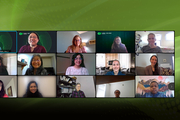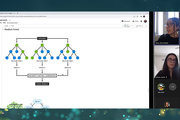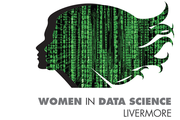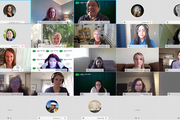Did you know we have a monthly newsletter? View past volumes and subscribe.
An open-source, data-science toolkit for energy: GridDS
Aug. 2, 2022 -
As the number of smart meters and the demand for energy is expected to increase by 50% by 2050, so will the amount of data those smart meters produce. While energy standards have enabled large-scale data collection and storage, maximizing this data to mitigate costs and consumer demand has been an ongoing focus of energy research. An LLNL team has developed GridDS—an open-source, data-science...
Defending U.S. critical infrastructure from nation-state cyberattacks
July 21, 2022 -
For many years, LLNL has been conducting research on cybersecurity, as well as defending its systems and networks from cyberattacks. The Lab has developed an array of capabilities to detect and defend against cyberintruders targeting IT networks and worked with government agencies and private-sector partners to share its cybersecurity knowledge to the wider cyberdefense community. LLNL has...
Introduction to deep learning for image classification workshop (VIDEO)
July 6, 2022 -
In addition to its annual conference held every March, the global Women in Data Science (WiDS) organization hosts workshops and other activities year-round to inspire and educate data scientists worldwide, regardless of gender, and to support women in the field. On June 29, LLNL’s Cindy Gonzales led a WiDS Workshop titled “Introduction to Deep Learning for Image Classification.” The abstract...
Assured and robust…or bust
June 30, 2022 -
The consequences of a machine learning (ML) error that presents irrelevant advertisements to a group of social media users may seem relatively minor. However, this opacity, combined with the fact that ML systems are nascent and imperfect, makes trusting their accuracy difficult in mission-critical situations, such as recognizing life-or-death risks to military personnel or advancing materials...
CASC team wins best paper at visualization symposium
May 25, 2022 -
A research team from LLNL’s Center for Applied Scientific Computing won Best Paper at the 15th IEEE Pacific Visualization Symposium (PacificVis), which was held virtually on April 11–14. Computer scientists Harsh Bhatia, Peer-Timo Bremer, and Peter Lindstrom collaborated with University of Utah colleagues Duong Hoang, Nate Morrical, and Valerio Pascucci on “AMM: Adaptive Multilinear Meshes.”...
Livermore WiDS provides forum for women in data science
March 18, 2022 -
LLNL celebrated the 2022 Global Women in Data Science (WiDS) conference on March 7 with its fifth annual regional event, featuring workshops, mentoring sessions and a discussion with LLNL Director Kim Budil, the first woman to hold that role. For the second straight year, the WiDS Livermore event was entirely virtual due to the COVID-19 pandemic. Attendees tuned in to view talks and...
Winter hackathon meets WiDS datathon
March 9, 2022 -
Sponsored by the DSI, LLNL’s winter hackathon took place on February 16–17. Hackathons are 24-hour events that encourage collaborative programming and creative problem solving. In addition to traditional hacking, the hackathon included a special datathon competition in anticipation of the Women in Data Science (WiDS) conference on March 7. Hackathon and datathon participants presented their...
WiDS Livermore returns on March 7
Feb. 10, 2022 -
We are hosting our 5th WiDS Livermore regional event to encourage our community of women in computing. We will watch the WiDS Stanford Livestream as well as feature Lab-focused technical talks, mentoring breakout sessions, and a career panel.
WiDS Livermore is an independent event hosted by LLNL Ambassadors as part of the annual Women in Data Science (WiDS) Worldwide conference organized by...
Unprecedented multiscale model of protein behavior linked to cancer-causing mutations
Jan. 10, 2022 -
LLNL researchers and a multi-institutional team have developed a highly detailed, machine learning–backed multiscale model revealing the importance of lipids to the signaling dynamics of RAS, a family of proteins whose mutations are linked to numerous cancers. Published by the Proceedings of the National Academy of Sciences, the paper details the methodology behind the Multiscale Machine...
LLNL establishes AI Innovation Incubator to advance artificial intelligence for applied science
Dec. 20, 2021 -
LLNL has established the AI Innovation Incubator (AI3), a collaborative hub aimed at uniting experts in artificial intelligence (AI) from LLNL, industry and academia to advance AI for large-scale scientific and commercial applications. LLNL has entered into a new memoranda of understanding with Google, IBM and NVIDIA, with plans to use the incubator to facilitate discussions and form future...
Building confidence in materials modeling using statistics
Oct. 31, 2021 -
LLNL statisticians, computational modelers, and materials scientists have been developing a statistical framework for researchers to better assess the relationship between model uncertainties and experimental data. The Livermore-developed statistical framework is intended to assess sources of uncertainty in strength model input, recommend new experiments to reduce those sources of uncertainty...
Summer scholar develops data-driven approaches to key NIF diagnostics
Oct. 20, 2021 -
Su-Ann Chong's summer project, “A Data-Driven Approach Towards NIF Neutron Time-of-Flight Diagnostics Using Machine Learning and Bayesian Inference,” is aimed at presenting a different take on nToF diagnostics. Neutron time-of-flight diagnostics are an essential tool to diagnose the implosion dynamics of inertial confinement fusion experiments at NIF, the world’s largest and most energetic...
Career panel series kicks off with women in Computing leadership roles
July 6, 2021 -
More than 100 LLNL staff and students gathered virtually for the first session of a new career panel series inspired by the annual WiDS conference and sponsored by the DSI. Panelists discussed how they have shaped their careers at the Lab and in Computing, their journeys into leadership roles, and how they navigate career challenges. Data scientist and panel series organizer Cindy Gonzales...
Laser-driven ion acceleration with deep learning
May 25, 2021 -
While advances in machine learning over the past decade have made significant impacts in applications such as image classification, natural language processing and pattern recognition, scientific endeavors have only just begun to leverage this technology. This is most notable in processing large quantities of data from experiments. Research conducted at LLNL is the first to apply neural...
The data-driven future of extreme physics
May 19, 2021 -
By applying modern machine learning and data science methods to “extreme” plasma physics, researchers can gain insight into our universe and find clues about creating a limitless amount of energy. In a recent perspective published in Nature, LLNL scientists and international collaborators outline key challenges and future directions in using machine learning and other data-driven techniques...
Lab event encourages growth of women in data science
March 17, 2021 -
Coinciding with International Women’s Day on March 8, LLNL’s 4th Women in Data Science (WiDS) regional event brought women together to discuss successes, opportunities and challenges of being female in a mostly male field. The Lab’s first-ever virtual WiDS gathering attracted dozens of LLNL data scientists as well as some from outside the Lab, and featured speakers, a career panel and...
Ana Kupresanin featured in FOE alumni spotlight
March 10, 2021 -
LLNL's Ana Kupresanin, deputy director of the Center for Applied Scientific Computing and member of the Data Science Institute council, was recently featured in a Frontiers of Engineering (FOE) alumni spotlight. Kupresanin develops statistical and machine learning models that incorporate real-world variability and probabilistic behavior to quantify uncertainties in engineering and physics...
Lab researchers explore ‘learn-by-calibration’ approach to deep learning to accurately emulate scientific process
Feb. 10, 2021 -
An LLNL team has developed a “Learn-by-Calibrating” method for creating powerful scientific emulators that could be used as proxies for far more computationally intensive simulators. Researchers found the approach results in high-quality predictive models that are closer to real-world data and better calibrated than previous state-of-the-art methods. The LbC approach is based on interval...
CASC research in machine learning robustness debuts at AAAI conference
Feb. 10, 2021 -
LLNL’s Center for Applied Scientific Computing (CASC) has steadily grown its reputation in the artificial intelligence (AI)/machine learning (ML) community—a trend continued by three papers accepted at the 35th AAAI Conference on Artificial Intelligence, held virtually on February 2–9, 2021. Computer scientists Jayaraman Thiagarajan, Rushil Anirudh, Bhavya Kailkhura, and Peer-Timo Bremer led...
DOE announces five new energy projects at LLNL
Nov. 13, 2020 -
The DOE today announced two rounds of awards for the High Performance Computing for Energy Innovation Program HPC4EI), including five projects at LLNL. HPC4EI connects industry with the computational resources and expertise of the DOE national laboratories to solve challenges in manufacturing, accelerate discovery and adoption of new materials and improve energy efficiency. The awards were...























